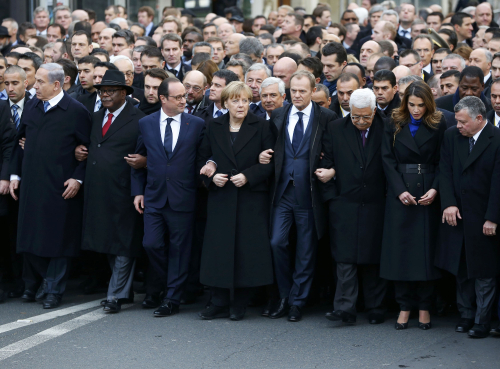 |
|
UNITY MARCH: French President Francois Hollande (fourth left) and dozens of foreign leaders join a massive march in Paris, France, on January 11 in honor of the victims killed in an attack on Charlie Hebdo magazine and a hostage-taking incident (CFP) |
The relatively long-standing peace and safety that France has enjoyed in modern times was shattered in a shooting that killed 12 people in Paris on January 7. The fact that the tragedy marks the first terrorist attack in France in two decades is, on the face of it, surprising, given the country's involvement in the war in Afghanistan and in recent air strikes against Islamic State targets in north Iraq.
The massacre was carried out by two gunmen at the offices of satirical magazine Charlie Hebdo. On January 9, another gunman hijacked a Jewish supermarket in east Paris and killed four customers in an attempt to get the suspects of the Charlie Hebdo attack out of a police siege. The violence came to an end after all three gunmen were killed in separate police operations later in the day.
Local police identified the two gunmen in the Charlie Hebdo shooting as Cherif Kouachi, 32, and his 34-year-old brother Said.
The Kouachi brothers, both Algerian French, were born in Paris. French media said that Cherif was a convicted Islamist who was jailed in 2008 and had long been known to police for militant activities. Cherif and Said returned to France from Syria last summer.
Amedy Coulibaly, 18, the hostage taker at the Jewish supermarket, was a friend of the Kouachi brothers, who graduated from a high school in Reims in northeast France last year.
Hayat Boumeddiene, Coulibaly's partner, is wanted by the police in connection with the shootings. Security authorities in Turkey have confirmed that she has travelled to Syria from Turkey.
Internal threats
The last time a serious terror attack struck France was in 1995 when an Algerian Islamic extremist group detonated a bomb at a subway in Paris and killed eight people.
The latest shootings revealed loopholes in French security, according to some antiterror experts. The three dead gunmen and the wanted Boumeddiene were under police surveillance for their contact with Islamic extremism. But the surveillance imposed on them ended last July because the police considered them to be a low-risk threat. The French public has criticized the authorities for failing to prevent the tragic bloodshed.
In fact, France has taken strict precautions against terror threats in the last few decades, said Zhang Jian, Director of the Institute of European Studies under the China Institutes of Contemporary International Relations (CICIR), in an interview with Beijing Review.
West European countries have strengthened their homeland intelligence and security since the bombing attacks in Madrid in 2004 and in London in 2005, Zhang said.
French security authorities have imposed strict surveillance on a large number of suspicious targets and detained some of them in connection with planned terror attacks.
Even so, the police surveillance failed to prevent the shootings in Paris partly because of laws limiting the amount of time a suspect can be held in custody, Zhang said.
The cost of surveillance work is also prohibitive. Generally, 25 police officers are needed to monitor a suspect round the clock, according to French media.
Another problem is that the terror threat is rising in Western Europe as many young people have left for the Middle East to join extremist groups. After a period of time, these well-trained militants have returned to their European homes in search of opportunities to launch attacks.
The Kouachi brothers seemed to have received combat training, as evidenced by their calmness in the shooting, Zhang said.
Yemen's al Qaeda branch on January 14 claimed responsibility for the deadly attack on Charlie Hebdo. One of its top commanders said in a video clip that the assault was in revenge for the weekly's publications of cartoons of the Prophet Mohammad, which is considered an insult in Islam.
The Globe and Mail, a Canadian newspaper, has reported that as many as 3,000 international militants who joined extremist groups in the Middle East have returned to their homes in Europe. The extremism has thereby spilled over to Europe from the war-torn region.
| 